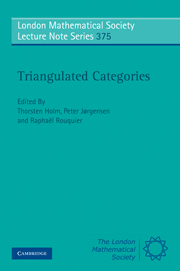Book contents
- Frontmatter
- Contents
- Preface
- Triangulated categories: definitions, properties, and examples
- Cohomology over complete intersections via exterior algebras
- Cluster algebras, quiver representations and triangulated categories
- Localization theory for triangulated categories
- Homological algebra in bivariant K-theory and other triangulated categories. I
- Derived categories and Grothendieck duality
- Derived categories and algebraic geometry
- Triangulated categories for the analysts
- Algebraic versus topological triangulated categories
- Derived categories of coherent sheaves on algebraic varieties
- Rigid dualizing complexes via differential graded algebras (survey)
Triangulated categories for the analysts
Published online by Cambridge University Press: 07 September 2011
- Frontmatter
- Contents
- Preface
- Triangulated categories: definitions, properties, and examples
- Cohomology over complete intersections via exterior algebras
- Cluster algebras, quiver representations and triangulated categories
- Localization theory for triangulated categories
- Homological algebra in bivariant K-theory and other triangulated categories. I
- Derived categories and Grothendieck duality
- Derived categories and algebraic geometry
- Triangulated categories for the analysts
- Algebraic versus topological triangulated categories
- Derived categories of coherent sheaves on algebraic varieties
- Rigid dualizing complexes via differential graded algebras (survey)
Summary
Abstract. This paper aims at showing how the tools of Algebraic Geometry apply to Analysis. We will review various classical constructions, including Sato's hyperfunctions, Fourier-Sato transform and microlocalization, the microlocal theory of sheaves (with some applications to PDE) and explain the necessity of Grothendieck topologies to treat algebraically generalized functions with growth conditions.
Introduction
In this paper, we will show how the tools of Algebraic Geometry– sheaves, triangulated and derived categories, Grothendieck topologies and stacks– play (or should play) a crucial role in Analysis.
Note that, conversely, some problems of Analysis led to new algebraic concepts. For example, one of the deepest notion related to triangulated categories is that of t-structure, and as a particular case, that of perverse sheaves, and these notions emerged with the study of the Riemann Hilbert correspondence, a problem dealing with differential equations.
Another example is the Fourier transform, clearly one of the most essential tools of the analysts, until it was categorified by Sato and applied to algebraic analysis, next transposed to algebraic geometry (the Fourier-Mukai transform).
The classical analysts are used to work in various functional spaces constructed with the machinery of functional analysis and Fourier transform, but Sato's construction of hyperfunctions [28] in the 60's does not use any of these tools. It is a radically new approach which indeed has entirely modified the mathematical landscape in this area.
Information
- Type
- Chapter
- Information
- Triangulated Categories , pp. 371 - 388Publisher: Cambridge University PressPrint publication year: 2010
Accessibility standard: Unknown
Why this information is here
This section outlines the accessibility features of this content - including support for screen readers, full keyboard navigation and high-contrast display options. This may not be relevant for you.Accessibility Information
- 2
- Cited by
